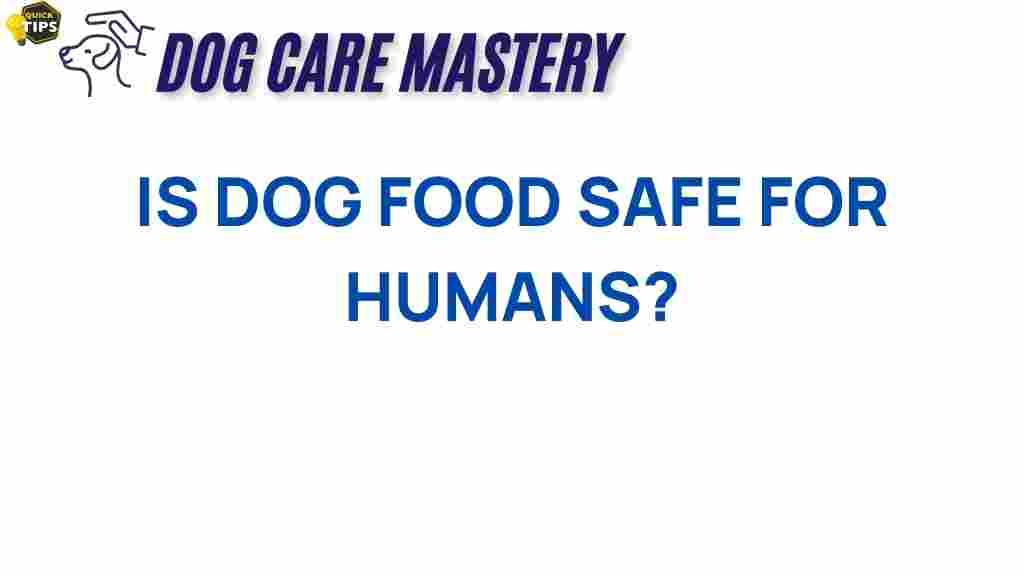Dog Food Safety: Is Dog Food Safe for Humans?
When it comes to the food we consume, safety is always a top concern. But have you ever wondered about the safety of dog food for humans? With the rising trend of pet ownership and the increasing popularity of natural and organic pet foods, questions surrounding dog food safety become pertinent. This article will explore whether dog food is safe for human consumption, the potential risks involved, and what you should know before considering it.
Understanding Dog Food Ingredients
To assess the safety of dog food for humans, it’s essential first to understand what goes into it. Dog foods typically contain a variety of ingredients, including:
- Meat (chicken, beef, lamb)
- Grains (rice, corn, wheat)
- Vegetables (carrots, peas, potatoes)
- Fats and oils (chicken fat, fish oil)
- Vitamins and minerals (calcium, vitamins A, D, E)
Most of these ingredients are indeed safe for humans to eat. However, the preparation and formulation of dog food are not necessarily geared toward human consumption.
The Nutritional Profile of Dog Food
Dog food is formulated to meet the nutritional needs of dogs, which are quite different from those of humans. For instance:
- Dog food often contains higher protein levels, which may not be suitable for everyone.
- Some dog foods include additives or preservatives that are not tested for human consumption.
- Dog food can be deficient in essential nutrients that humans require, such as certain vitamins.
While the ingredients may be safe, the overall nutritional balance in dog food may not meet human dietary needs.
Potential Risks of Eating Dog Food
Despite the seemingly harmless ingredients, there are several risks associated with consuming dog food:
- Contaminants: Dog food can contain harmful bacteria such as Salmonella or E. coli, which pose serious health risks to humans.
- Allergic Reactions: Ingredients like grains and certain meats may trigger allergies in some individuals.
- Unregulated Ingredients: Unlike human food, dog food is not as strictly regulated, leading to possible inclusion of low-quality ingredients.
- Long-term Health Effects: Regular consumption of dog food may lead to nutritional imbalances or deficiencies.
What Happens if You Accidentally Eat Dog Food?
If you accidentally consume dog food, the reaction may vary depending on the amount ingested and individual sensitivities. Here’s what you can do:
- Stay Calm: A small amount of dog food is unlikely to cause significant harm.
- Monitor Symptoms: Look for any signs of gastrointestinal discomfort, such as nausea, vomiting, or diarrhea.
- Seek Medical Attention: If severe symptoms occur or if you have underlying health conditions, consult a healthcare professional immediately.
Is There Any Human-Grade Dog Food?
Yes, some brands offer human-grade dog food, which means the ingredients are safe for human consumption and processed in facilities that handle human food. However, even with human-grade dog food, it is primarily formulated for dogs’ nutritional needs.
For a comprehensive list of reputable human-grade dog food brands, you can visit this resource.
Alternatives to Dog Food for Humans
If you’re looking for safe and nutritious alternatives to dog food, consider these options:
- Homemade Pet Food: Preparing balanced meals for your dog can also ensure better quality and safety.
- Pet Treats: Some pet treats are specifically made for both dogs and humans and are safe to share.
- Human Food: Stick to whole foods like fruits, vegetables, lean meats, and grains that are safe and nutritious for humans.
Step-by-Step: What to Check Before Eating Dog Food
If you find yourself in a situation where you are considering eating dog food, here’s a step-by-step guide:
- Check the Label: Ensure it’s made from high-quality, human-grade ingredients.
- Inspect for Contaminants: Look for any signs of spoilage or contamination.
- Assess Your Allergies: Be mindful of any known allergies to ingredients listed.
- Consult a Doctor: If unsure, seek professional advice before consuming.
Common Misconceptions About Dog Food Safety
Misinformation can lead to confusion regarding dog food safety. Here are some common misconceptions:
- All dog food is unsafe for humans: Not all dog food is dangerous; high-quality, human-grade options are available.
- Dog food is the same as human food: Dog food lacks the balance of nutrients that humans require.
- Eating dog food is a sign of desperation: Some may choose dog food for economic reasons or emergencies, but it should not be a regular choice.
Troubleshooting: What to Do If You Encounter Issues
If you experience any issues after consuming dog food, consider the following troubleshooting tips:
- Stay Hydrated: Drink plenty of water to help flush your system.
- Monitor Symptoms: Keep an eye on your health for any unusual signs.
- Document What You Ate: If symptoms arise, knowing exactly what you consumed can help medical professionals.
- Avoid Future Incidents: Keep dog food out of reach to prevent accidental consumption.
Conclusion: Should You Eat Dog Food?
In conclusion, while some dog foods may contain ingredients that are safe for human consumption, the overall formulation is not designed for human dietary needs. The potential risks involved with consuming dog food, including contamination and nutritional deficiencies, make it a less-than-ideal option for humans.
It’s essential to prioritize dog food safety and ensure that what you consume is safe, nutritious, and suitable for your dietary requirements. If you’re ever in doubt, consult professionals or stick to foods specifically formulated for human consumption.
For more information on pet nutrition and safety, visit this article.
This article is in the category Health and created by dogcaremastery Team
